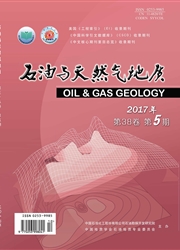

 中文摘要:
中文摘要:
南华北地区是我国具有油气勘探潜力的地区之一,上古生界煤系地层是该地区主要的油气勘探层系之一。在较全面收集和补充实测有机质镜质体反射率数据的基础上,结合最大热解峰温(Tmax)、孢粉色变指数等古温标数据,认为研究区上古生界热演化呈不均一性,总体呈北高南低、西高东低的分布格局。结合地层剥蚀厚度恢复、古构造演化分析、裂变径迹和岩浆岩测年等,认为研究区上古生界经历了复杂的热演化与生烃史,总体上可划分为早期生烃型、早-晚期生烃型和持续生烃型3种生烃热演化类型。上古生界有机质早期主要以深成变质作用为主;岩浆热变质作用和动力变质作用是局部热演化异常增高的主要原因;中生代中晚期的区域构造热事件是太康-济源古生界区域性高热演化形成的主控因素。从热演化研究的角度考虑,寻找具备二次生烃和成藏、保存条件的上古生界,是南华北具现实意义的勘探方向,主要分布在中-新生界凹陷的较深部位,如倪丘集凹陷中部、谭庄-沈丘凹陷中部等。
 英文摘要:
英文摘要:
The southern North China is considered one of the areas with great hydrocarbon potentials.The Upper Paleozoic coal-bearing strata are major exploration targets in the area.An analysis of more than 600 sets of vitrinite reflectance(Ro) data and other geothermometer data such as Tmax and spore color index indicates that the thermal evolution of the Upper Paleozoic is uneven,showing a general trend of higher in the north and west but lower in the south and east.By combining a reconstruction of the eroded strata with an analysis of the paleo-structure evolution,fission track dating and magmatic rocks dating,we concluded that the Upper Paleozoic strata experienced complex thermal evolution history and hydrocarbon generation history,and identified three hydrocarbon generation types including the early,the early-late and the continuous types.The organic matter in the Upper Paleozoic strata mainly experienced hypozonal metamorphism in early stage.Magmatic thermal metamorphism and dynamic metamorphism were the major causes of local abnormal high thermal evolution.The regional tectonic-thermal events in the Mid-Late Mesozoic were the crucial factors controlling the regional high thermal evolution of the Paleozoic in Taikang-Jiyuan area.The Upper Paleozoic with favorable conditions for secondary hydrocarbon generation,accumulation and preservation are the realistic exploration targets.They mainly occur in deep of Meso-Cenozoic depression,such as the middle part of the Niqiuji sag and the middle part of the Tanzhuang-Shenqiu sags.
 同期刊论文项目
同期刊论文项目
 同项目期刊论文
同项目期刊论文
 Late Carboniferous-Early Permian Sequence Stratigraphy and Depositional Evolution in the Northeast O
Late Carboniferous-Early Permian Sequence Stratigraphy and Depositional Evolution in the Northeast O 期刊信息
期刊信息
